- Home
- James A. Michener
Report of the County Chairman Page 14
Report of the County Chairman Read online
Page 14
Yet when I returned from Matsu to the mainland of Asia I wrote a series of two widely published articles in which I advocated precisely the policy that was later to be supported by Vice President Nixon in the second television debate. I argued that Matsu, inconsequential though it might be from a purely military point of view, represented psychological factors which made it important both to the Formosan Chinese and to the United States. I argued that because of those factors it must be kept from communist hands, even at the cost of war, and even if that war involved nuclear weapons. When it was discovered that I had been on the islands, I was invited to address a segment of the war college on the subject of Matsu, since none of the military then discussing the problem had seen Matsu.
But no sooner had my articles appeared than I was subjected to a barrage of criticism by foreign correspondents working in the area and by most of the military men as well. They pointed out three grave fallacies in my argument: first, there was no conceivable advantage to be gained militarily from holding onto the islands, not even if they were to serve as a radar listening post, because other locations already in American hands were better qualified to perform that function; second, there was no psychological advantage in holding onto these rocks, and no question of face involved for either the Formosan Chinese or for the Americans, because only a few weeks before, our side had voluntarily evacuated the Tachens to the north, which did possess a few military advantages, and they stressed that President Eisenhower himself had approved the Tachen evacuation; third, they told me what I had not known before, namely, that every military leader both in the area and at home had advised against the military defense of the Matsu group. They further believed that two distinct American military and civil missions had already approached Generalissimo Chiang with advice that he get out of the Matsus as swiftly as possible. Later President Eisenhower himself agreed publicly that from a military point of view the islands were indefensible and their occupation inadvisable.
Thus I had already, personally, been completely through the line of reasoning adopted by Mr. Nixon. I had advocated it, argued in defense of it, and found it totally insupportable. Therefore when I gasped at Senator Kennedy’s introduction of the subject it was not because I disagreed with his reasoning, for he was correct in his attitude and I better than most knew it, but it was because I knew that this subject ought not to be discussed in public. I therefore knew there would be trouble for the Democrats, because the Nixon-Michener thesis was a popular one to defend, and an easy one on which to excite patriotic responses, even though it was one hundred percent wrong. How many times during the campaign did I have to answer the heckling question: “How can you be in favor of a man who wants to give away our territory to the communists?” I am quite convinced that in my answer I had truth on my side, but I am also sure that we lost a lot of votes on this Quemoy-Matsu business.
Therefore, imagine my dismay on the third debate when Senator Kennedy suggested that we support anti-Castro rebel forces in Cuba! I had just come from Mexico and Guatemala, where ninety-nine percent of the intellectuals I had met favored Castro as an abstract concept of revolutionary zeal, even though the wiser ones rejected many of the specific actions of Castro the man. One of the reasons why Latin American professors, writers and students liked Castro was that he had defended Cuba against what they called “the intrusions by Norteamericanos,” and now Senator Kennedy was suggesting further intrusions. Again Mr. Nixon was quick to challenge him on this, and again the Vice President had a popular and an easy cause to defend. As for myself, again I waited with real fear for President Eisenhower to state briefly and bluntly that Mr. Kennedy had spoken intemperately, for such an accusation by the President would have hurt the Democratic campaign most seriously. But again the President remained silent.
In my public meetings I could now count on two surefire embarrassments, and I found myself speaking more and more about Cuba, and it was interesting that again I had started out years ago defending Mr. Nixon’s precise position and had been educated away from it both by the truth and by the force of international politics. In short, on the Cuba matter Senator Kennedy was again one hundred percent right and Mr. Nixon completely wrong, although the greater error lay in introducing the subject at all.
I knew that Mr. Nixon was wrong because on one of my long stays in Asia I had lived in Bangkok, the capital of Thailand, when John Peurifoy was our ambassador. Mr. Peurifoy was a close friend of Leonard Lyons, the New York columnist whom I had known for many years, and through Mr. Lyons I met Peurifoy shortly before his tragic death in a Siamese highway accident. Ambassador Peurifoy was not altogether popular with the formal State Department, because he had risen rather rapidly and his feeling that he was not wholly accepted made him more prone to talk about diplomatic matters than the typical career ambassador. What he liked to discuss was the wholly illegal steps whereby the United States joined forces with Guatemalan patriots to throw out of power the communist dictator Jacob Arbenz, who had usurped control of Guatemala. Mr. Peurifoy had been the American agent in this dramatic operation, and it is a pity that he died before committing to paper his memoirs on the subject; from what he intimated to me the action in Guatemala constituted a classic example of how beleaguered democracies can defend themselves against the kind of communist putsch that destroyed Czechoslovakia and Hungary. In other words, in Guatemala the United States had done exactly what Vice President Nixon mistakenly decried as irresponsible, and the free world had subsequently applauded the act. Ambassador Peurifoy, on the other hand, had held that we had intervened quickly, effectively and with the best interests of Guatemala at heart. In so doing we saved a sovereign nation and perhaps a hemisphere.
I was forced to admit that Mr. Nixon was correct in charging that Mr. Kennedy had been imprudent in discussing Cuba’s parallel situation in public, but for Mr. Nixon to have implied that what the senator had mentioned was beyond the pale of discussion was downright misleading. Yet at the time, the charge seemed to gain votes for Mr. Nixon; I can testify that I was unsuccessful in arguing with people who accepted Mr. Nixon’s charge that Senator Kennedy had been hasty and immature. But as we shall see, I later came to the conclusion that Senator Kennedy’s forthright stands on Matsu and Cuba were responsible for his winning critical support in the crucial days of the election.
We were now into the hard-fought central weeks of the campaign and these were the subjects which we were called upon to discuss day after day: First, Kennedy’s youth. Initially the electorate was honestly worried about the senator’s relative youth, and whereas his deportment on the first debate assured some, many remained skeptical, and there was little I could do to dissuade them from their opinion. In time however I developed the device of stating, “Senator Kennedy is older than Teddy Roosevelt was when he assumed the Presidency, and it seems to me we need a vigorous young man who will have the energy to attend to the job.” I doubt that this reasoning was productive.
Second, Kennedy’s inexperience. There was real apprehension about Kennedy’s lack of experience. I was able to cite the fact that he had served in the federal government exactly as long as Vice President Nixon, but this was not too effective, because my critics always pointed out that Nixon had had administrative experience, whereas Kennedy had not. Later I retreated to my old device of saying, “Senator Kennedy has had exactly fourteen years more experience in the United States government than President Eisenhower had when he assumed the Presidency.” This didn’t carry much weight, either.
Third, the likelihood of inflation. One of the most telling charges, at least in Bucks County, was that the election of Senator Kennedy would automatically mean inflation, and I feel that if President Eisenhower had gone on the air midway through the campaign to lambaste Democratic spending, past and future, he might have swung the election, but he was silent. This was the more curious in that during his incumbency he had been so often outspoken on this matter. I used to teach economics and felt that Senator Kennedy’s reliance upon
increased national product to provide an enhanced tax base which would pay for services and prevent inflation was correct, but I found it difficult to explain this point to my listeners, and I am afraid I lost a lot of votes for the Democrats. Later I struck upon the device of arguing, “Let’s put it this way. How many people in this room tonight are living in houses that were not even built eight years ago? On streets that were not paved? How many of your children go to schools that were not in being eight years ago? The economic growth represented in this room alone has added hundreds of thousands of dollars of new wealth which can be taxed by our various governments. Senator Kennedy says that additional growth in the next eight years will provide similar new wealth to be taxed. Certainly, we’ll need increased funds, and we’ll have increased economic turnover from which to provide them.” Even more helpful in debate was another gambit which had the additional merit of arousing laughter: “I sympathize with everyone who fears inflation, and I acknowledge that the Democrats have to fight this evil. But let’s not get the problem out of focus. How many of you women remember the election of 1952 when the Republicans carried around that tired old basket of groceries, telling you how the Democrats had allowed the price to creep up. What were the figures they used? ‘This basket used to cost $3.00, but under the Democrats it costs $5.00.’ Well, the other day we costed out that basket, as the Vice President says, and what do you suppose those same tired vegetables cost today? $6.75! The Republicans didn’t want the price of that basket to go up, but it went up because the natural speed of our economy increased, and nobody could stop it. In 1968, after the Democrats have had two terms, that crazy old basket will probably cost $9.00, but you’ll be better able to pay $9.00 then than you were to pay the original $3.00, because Senator Kennedy has promised that under his administration the natural speed of our economy will increase sharply.” In discussing inflation and gross national product we relied very heavily on the reports of the Rockefeller brothers, for they supported the Democratic cause most wonderfully. At times, if you had listened to me argue the campaign, you might have gotten the impression that Nelson Rockefeller was running for President on the Democratic ticket, for I would quote him on perhaps eight or ten questions in a row. He was most helpful, or rather, to be specific, the reports of his brothers’ inquiries were both relevant and cogent, and I often had the twisted feeling that if some Democrat of little stature had been nominated in Los Angeles, with Rockefeller having been nominated in Chicago, I would now be touring Bucks County with almost the same arguments but in defense of a Republican candidate. That Rockefeller would have carried Pennsylvania, and most of the Electoral College, there can be no question in my mind. To prove this, a fair percentage of people who told me they had decided to vote for Kennedy, Republicans and Democrats alike, confided that they would have preferred to vote for Rockefeller. Happy as I was with the nomination of Senator Kennedy, and increasingly impressed as I was with his capacity, I could only assure such people that I was damned glad Rockefeller had been turned down by the Republicans.
Fourth, the charge of socialism. I never paid any attention to the flagrant charges of socialism or complete fiscal irresponsibility brought against the Democrats. I said that I would not dignify such charges by even acknowledging them. Consistently I took the public position that if my questioner felt deeply that the Democrats were socialist revolutionaries he should certainly vote for the Republicans because he would never be happy in my party. I may have lost some votes, but I believe, and often said so publicly, that there were certain votes I didn’t want.
Fifth, the question of war. At most meetings I was plagued by the question: “Is it not true that in the last fifty years the Democrats have led us to war three times?” My answer was carefully worked out to play upon the very mentalities that gave credence to such theories, and I tried never to vary it: “Now there’s a typically tricky statement if I ever heard one. Why does the Republican party always say ‘the last fifty years’? Because they know that if they said the last sixty-two years they’d bring to your attention one of the most indefensible wars any nation ever stumbled into, the Spanish-American War, which was engineered by a Republican President, William McKinley. And if the Republicans go back a hundred years they’ll have to include the Civil War, and we know that the Republican party was practically called into being to prosecute that war. As a Democrat I’m eternally grateful that a great Republican President was on hand to fight it, Abraham Lincoln.” This invariably produced applause, but had practically no effect on any Republicans present. As one elderly lady plaintively pointed out, “But we’re talking about the last fifty years and to go back to William McKinley isn’t fair.” However, there was an additional peroration which I tried by accident one night, frustrated as I was by the war charge, and to my surprise it worked: “And I would like to point out to my Republican friends that if Franklin D. Roosevelt had not taken this country into war against tyranny, nobody in America would ever have heard of Dwight D. Eisenhower, and the Republicans would never have had a President.” This always brought cheers, but for the life of me I do not understand even now what the statement says nor why it seemed so effective an answer to the war charge.
Most of my time was spent carefully arguing the basic facts of the campaign, and for every audience that plagued me with irrelevant questions requiring irrelevant answers, there were a dozen groups of people truly interested in the future of their nation and the probable impact upon that nation of either Kennedy or Nixon. There was a real choosing up of sides, and from what I saw there were many thousands of voters in Pennsylvania who did not commit themselves until fairly late in the campaign.
It was my constant pleasure to meet with these people. I believe a strict count of the homes in which I spoke would reveal that somewhat more than half were Republicans, and I could not have been treated more hospitably. This stemmed partly from the fact that I tried most diligently to talk sense. I never claimed that the Democrats would win Bucks County; I said I thought we might squeak by in Pennsylvania. I was sure we would carry New York and Ohio, but I feared for California and Texas. I do not think that at any meeting I conducted I ever failed to tell the truth or to label a personal opinion as merely that. Anyone who followed me about got an honest view of one man’s judgment of the campaign. The only doubtful item was my insistence that Kennedy would win 410 electoral votes, but I had claimed this so often that I think I believed it myself.
There was one dreadful night when during a public debate a misguided Republican charged the entire Democratic party with being socialistic and communistically inclined. Fortunately he spoke first, so that when I took the microphone I was able to throw away my notes and launch into the most severe castigation of an opponent I have ever indulged in. Later my wife asked, “But why did you shout?” I replied that sometimes a man feels like shouting because he doesn’t want anyone to have the slightest doubt as to where he stands. “Nobody had any doubt,” she assured me. “You said the same thing over and over again about a dozen times.” I replied that some things merited repetition and she said, “They got it.”
But with that exception the Presidential campaign in Bucks County was a reassuring display of honest political difference honestly expressed. The Republican orators hammered Senator Kennedy very sharply, but not, I think, unfairly. I heard not a single smear on Vice President Nixon, except when some young Republicans appeared at one of our rallies with a big sign, “The White House is not for sale.” Said our first speaker, “Why don’t you tell that to Howard Hughes?”
One of the reasons why there was practically no mud-slinging in our national campaign was that a curious turn of affairs engulfed our local politics right at the start. Were I to try, as writer, to set up a situation in a political novel equal to the one that developed as I watched, I could not accept what I saw happen, because it would be far too melodramatic.
The titular head of our party in Bucks County was a white-haired Irishman, John Mulligan from Bristol. He was th
e kind of politician to whom everybody, at the beginning of a meeting, said, “How’re the daughters, John?” He had two beautiful daughters, one at school studying to be a teacher, the other married and in Germany, I believe, and I had known John only a few days before I found myself quite sincerely asking him, “How are the girls, John?” He always smiled happily and told us how they were.
Mulligan had been a ward politician when the pickings were tough and now had a job in the unemployment-compensation department of Governor Lawrence’s state political team. He was a gentle man and a gentleman to whom the party strife that kept the northern and southern ends of the county separated was a tragedy. Once during the hardest part of the campaign, when I was drugged for want of sleep, I was maneuvered into uttering harsh words and stamping out of a meeting like a child. It was good, kindly John Mulligan who came after me to say that we must not let things like that happen. I suppose that Mulligan would do almost anything to insure party harmony, but during his incumbency as county chairman he was to experience little of it.
We were sitting in the county office one afternoon, a rather glum group of men, for we had been unable to get the campaign off the ground. Mulligan and the county road commissioner, Oscar Booz, and Sam Thompson were lamenting the fact there wasn’t any good issue we could hang onto locally and Mulligan said, “You know, it’s funny but I’ve been through half a dozen campaigns like this and I’ve found that you can always trust the Republicans to do something that’ll solve our problems for us.”

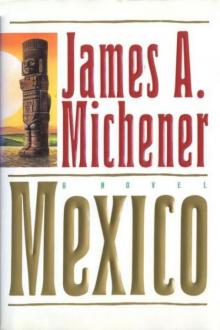 Mexico
Mexico The World Is My Home: A Memoir
The World Is My Home: A Memoir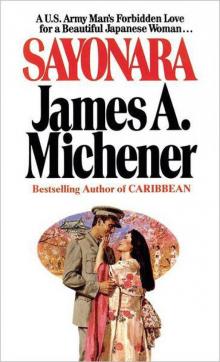 Sayonara
Sayonara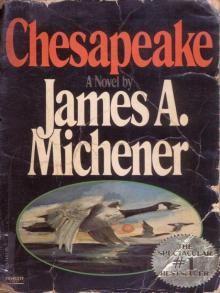 Chesapeake
Chesapeake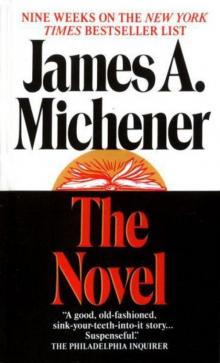 The Novel
The Novel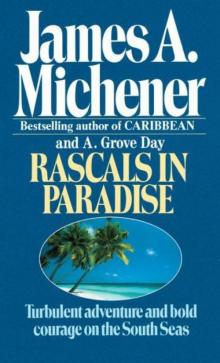 Rascals in Paradise
Rascals in Paradise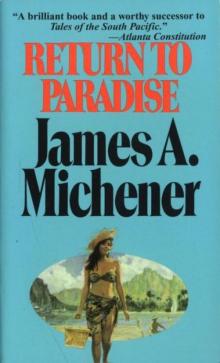 Return to Paradise
Return to Paradise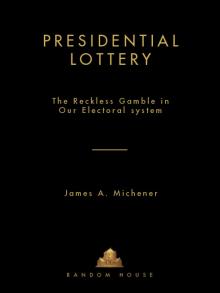 Presidential Lottery: The Reckless Gamble in Our Electoral System
Presidential Lottery: The Reckless Gamble in Our Electoral System The Source
The Source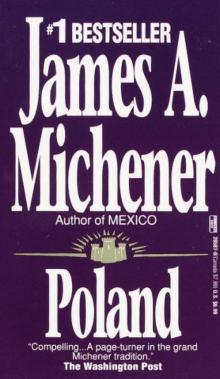 Poland
Poland Space
Space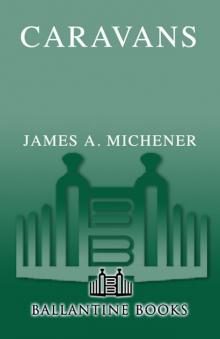 Caravans
Caravans Creatures of the Kingdom: Stories of Animals and Nature
Creatures of the Kingdom: Stories of Animals and Nature Iberia
Iberia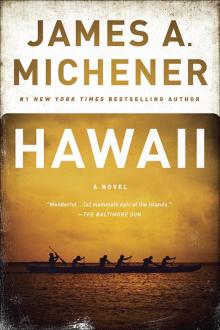 Hawaii
Hawaii The Watermen: Selections From Chesapeake
The Watermen: Selections From Chesapeake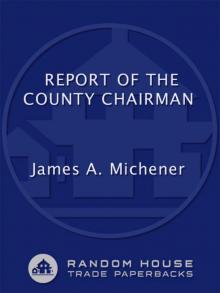 Report of the County Chairman
Report of the County Chairman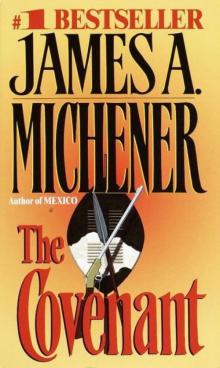 The Covenant
The Covenant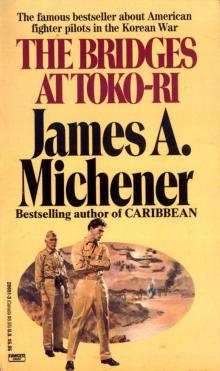 The Bridges at Toko-ri
The Bridges at Toko-ri Matecumbe
Matecumbe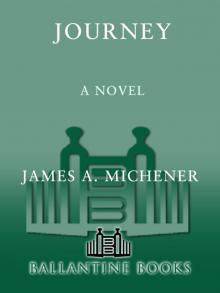 Journey: A Novel
Journey: A Novel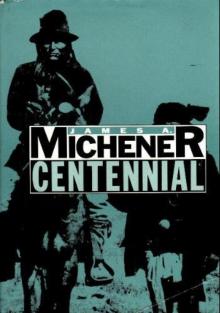 Centennial
Centennial Sports in America
Sports in America Texas
Texas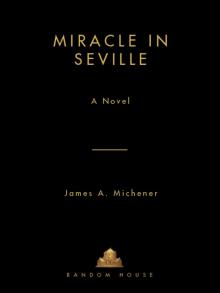 Miracle in Seville
Miracle in Seville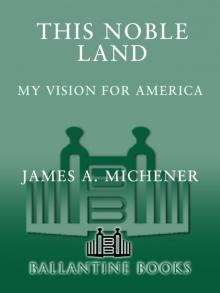 This Noble Land: My Vision for America
This Noble Land: My Vision for America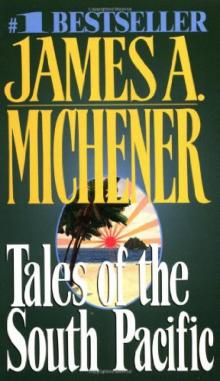 Tales of the South Pacific
Tales of the South Pacific Bridges at Toko-Ri
Bridges at Toko-Ri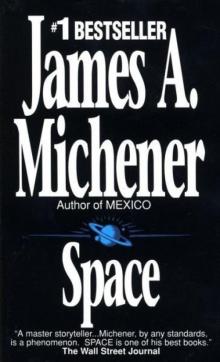 Space: A Novel
Space: A Novel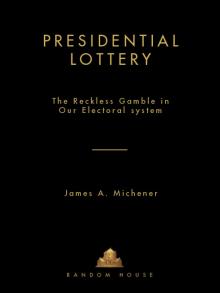 Presidential Lottery
Presidential Lottery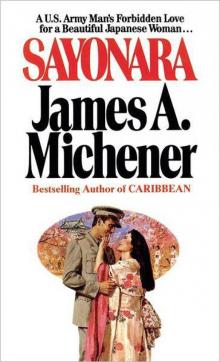 Sayonara: A Novel
Sayonara: A Novel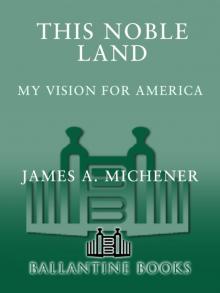 This Noble Land
This Noble Land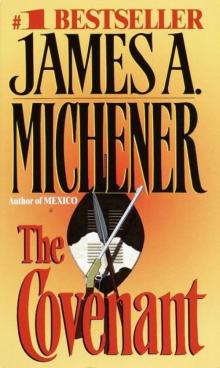 The Covenant: A Novel
The Covenant: A Novel Miracle in Seville: A Novel
Miracle in Seville: A Novel The Bridge at Andau
The Bridge at Andau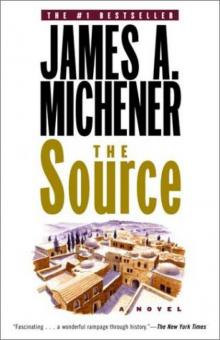 Source
Source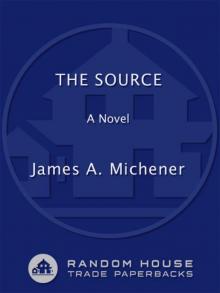 The Source: A Novel
The Source: A Novel Journey
Journey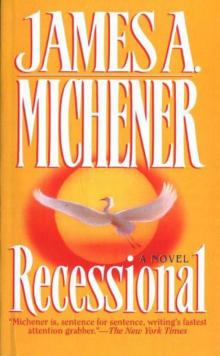 Recessional: A Novel
Recessional: A Novel Legacy: A Novel
Legacy: A Novel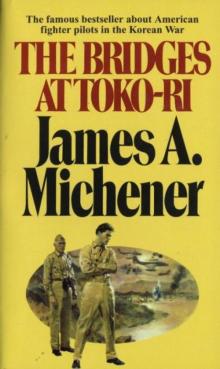 The Bridges at Toko-Ri: A Novel
The Bridges at Toko-Ri: A Novel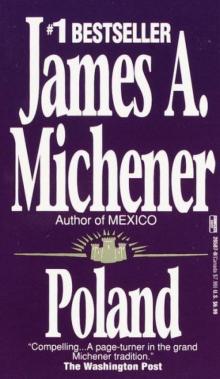 Poland: A Novel
Poland: A Novel